
Sustainability Science
metrics 2024
Integrating Science and Policy for Sustainable Progress
Introduction
Sustainability Science, an esteemed journal published by SPRINGER JAPAN KK, serves as a pivotal platform for interdisciplinary research dedicated to sustainable development and environmental stewardship. With its ISSN 1862-4065 and E-ISSN 1862-4057, this journal has established itself as a leading voice in the realms of Ecology, Geography, Health Sociology, and Global Change, proudly holding a Q1 position across multiple categories as of 2023. Notably, it ranks exceptionally well within Scopus, with rankings such as #11 out of 371 in Health (Social Science) and #27 out of 1466 in Sociology and Political Science, underlining its high impact and relevance in pertinent research areas. The journal emphasizes the importance of integrating ecological science with social and policy dimensions, thus encouraging collaboration among researchers, practitioners, and policymakers alike. While it currently operates under traditional access models, its rigorous selection process and comprehensive peer-review procedures ensure that only the most reliable and significant research contributes to the discourse on sustainability, making it an invaluable resource for anyone committed to creating a sustainable future.
Metrics 2024
 1.46
1.46 5.10
5.10 6.80
6.80 87
87Metrics History
Rank 2024
Scopus
IF (Web Of Science)
JCI (Web Of Science)
Quartile History
Similar Journals
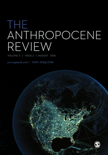
Anthropocene Review
Illuminating the Intersections of Ecology and Human ActivityAnthropocene Review is a prominent academic journal published by SAGE Publications Inc. that focuses on the interdisciplinary study of the Anthropocene—a term used to describe the significant global changes resulting from human activity. Launched in 2014 and forming part of its converged years until 2024, this journal has quickly established itself as an essential resource for researchers and professionals in the fields of Ecology, Geology, and Global and Planetary Change, as evidenced by its notable Q2 and Q3 rankings in these categories. With a solid Scopus ranking placing it within the top tiers of Earth and Planetary Sciences and Environmental Science disciplines, the Anthropocene Review aims to shed light on the complex interactions between human actions and the environment, fostering a deeper understanding of sustainability and ecological impacts. While currently not an open-access journal, it provides crucial research findings and theoretical advancements that appeal to students and academics alike, shaping the discourse on our planet's future.
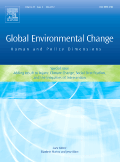
GLOBAL ENVIRONMENTAL CHANGE-HUMAN AND POLICY DIMENSIONS
Exploring the Nexus of Humanity and NatureGLOBAL ENVIRONMENTAL CHANGE-HUMAN AND POLICY DIMENSIONS is a premier academic journal published by Elsevier Science Ltd, based in the United Kingdom. With a significant focus on the interplay between human activities and environmental change, this journal serves as a critical platform for researchers and policymakers alike. It boasts an impressive impact factor and ranks in the top quartile (Q1) across multiple categories, including Ecology, Geography, and Environmental Science, reflecting its high relevance and influence within the respective fields. The journal provides insightful analyses and empirical studies from 1990 to 2024, fostering a deeper understanding of the socio-political dimensions of global environmental issues. Although it does not offer open access options, readers can still access the journal through various university libraries and institutional subscriptions, ensuring wide dissemination of important research findings. With its dedication to promoting interdisciplinary dialogue and evidence-based policy development, GLOBAL ENVIRONMENTAL CHANGE remains an invaluable resource for academics, practitioners, and students committed to addressing pressing environmental challenges.
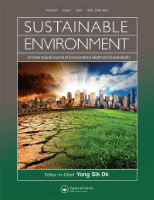
Sustainable Environment
Connecting ideas, practices, and policies for a sustainable world.Sustainable Environment, published by Taylor & Francis Ltd, is a pioneering journal dedicated to advancing the field of sustainability studies. Since its inception in 2021, this open-access journal has sought to provide a platform for multidisciplinary research that addresses pressing environmental challenges and sustainable practices. With a commitment to disseminating high-quality research swiftly, Sustainable Environment aims to engage researchers, policymakers, and practitioners across various domains, fostering scholarly dialogue and innovation. The journal covers a broad range of topics, including climate change, resource management, and sustainable development, making it a vital resource for anyone looking to contribute to and understand contemporary environmental issues. With its flexible access options, readers from all backgrounds can benefit from the latest insights and findings in sustainability research, thereby promoting a more sustainable future.
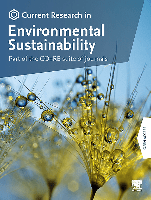
Current Research in Environmental Sustainability
Unlocking Knowledge for Global Environmental ImpactCurrent Research in Environmental Sustainability is a pioneering open-access journal published by ELSEVIER that has quickly established itself at the forefront of environmental science since its inception in 2020. With an impressive Q1 ranking in the Miscellaneous category of Environmental Science and a notable Scopus rank of 47/233, this journal serves as a vital platform for researchers, professionals, and students seeking to explore innovative solutions to pressing environmental issues. The journal's scope encompasses a wide array of topics related to sustainability, providing a forum for high-quality research that promotes sustainable development practices globally. As it continues to expand its reach through open access, Current Research in Environmental Sustainability not only enhances the dissemination of scientific knowledge but also ensures that critical environmental findings are readily available to a diverse audience, fostering collaboration and impact in the field.
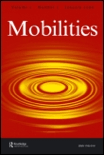
Mobilities
Unraveling the Complexities of Movement and SpaceMobilities is a premier scholarly journal published by Routledge Journals, Taylor & Francis Ltd, delving into the multifaceted dimensions of mobility across various disciplines. With an ISSN of 1745-0101 and an E-ISSN of 1745-011X, this esteemed journal plays a pivotal role in advancing knowledge and understanding in fields such as Demography, Geography, Planning and Development, and Sociology. Routinely recognized for its high-quality research, Mobilities boasts an impressive Q1 ranking across these categories in 2023, underscoring its significance in the academic landscape and reflecting its impact factor within the academic community. Though it operates under a subscription model, the journal prioritizes accessibility to cutting-edge research and theoretical debates that explore the critical roles of movement and mobilities in shaping societies and environments. Whether you are a researcher, professional, or student, Mobilities provides a vital platform for engagement with contemporary issues related to mobility, making it an essential resource for anyone seeking to contribute to or understand the dynamics of mobility in today’s world.
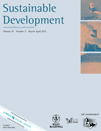
SUSTAINABLE DEVELOPMENT
Exploring the Frontiers of Sustainability and DevelopmentSUSTAINABLE DEVELOPMENT is a premier academic journal published by WILEY, dedicated to the dynamic fields of Development, Renewable Energy, and Sustainability. With a strong commitment to advancing knowledge, this journal holds an impressive impact factor that places it in the Q1 quartile in both the Development and Renewable Energy categories for 2023, underscoring its significant influence in the social sciences. Boasting a Scopus rank of 4th out of 306 in Development and 26th out of 270 in Renewable Energy, it reflects a high level of scholarly excellence and relevance, achieving percentiles of 98th and 90th, respectively. Established in 1993, and set to continue through 2024, the journal serves as a crucial platform for researchers, professionals, and students to share groundbreaking insights and foster interdisciplinary dialogue. Although not an open-access journal, it offers a wealth of essential research that addresses the pressing challenges of sustainable development, contributing to a more sustainable future.

Challenges in Sustainability
Exploring Interdisciplinary Approaches to Sustainability ChallengesChallenges in Sustainability, published by LIBRELLO PUBLISHING HOUSE in Switzerland, is a preeminent Open Access journal dedicated to advancing knowledge in the fields of sustainability, ecology, and environmental management. With its ISSN 2297-6477, this journal has been pivotal since its inception in 2013, providing a platform for innovative research and discourse on sustainable practices and policies. The journal currently holds a Q2 ranking in notable categories such as Ecology, Geography, Planning and Development, and Nature and Landscape Conservation, reflecting its significant contribution to these critical areas. Access options are freely available to foster a wider dissemination of knowledge, engaging researchers, professionals, and students alike. As the world grapples with pressing environmental challenges, Challenges in Sustainability serves as an essential resource for those seeking to address complex sustainability issues through interdisciplinary research and informed policy advocacy.
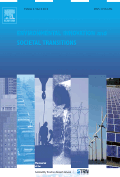
Environmental Innovation and Societal Transitions
Shaping Tomorrow's Sustainability Through Today's ResearchEnvironmental Innovation and Societal Transitions, published by ELSEVIER, stands as a leading academic journal in the fields of Environmental Science, Renewable Energy, and Social Sciences. With an impressive impact factor and ranking in the 98th percentile in Social Sciences and 96th percentile in Environmental Science, this journal is recognized for its rigorous peer-reviewed articles that contribute significantly to the discourse on sustainability and technological advancements. Established in 2011, it embodies the dynamic interplay between environmental innovation and societal adaptation, making it crucial for researchers, professionals, and students dedicated to understanding and shaping sustainable futures. The journal's commitment to high-quality research is evidenced by its placement in the Q1 category across multiple disciplines, asserting its pivotal role in advancing knowledge and practical solutions in these critical areas of study.

ERDE
Empowering Researchers to Shape a Sustainable Tomorrow.ERDE is an esteemed open-access journal published by the GESELLSCHAFT ERDKUNDE BERLIN, specializing in a broad spectrum of fields including Atmospheric Science, Earth and Planetary Sciences, Ecology, and Social Sciences. Since its inception in 1977, ERDE has established itself as a pivotal resource for researchers, professionals, and students, providing a platform for high-quality, peer-reviewed research articles that contribute significantly to these disciplines. With a current impact factor reflected in its Q3 ranking within several categories and notable Scopus rankings, the journal emphasizes interdisciplinary approaches that address complex global challenges. Open access since 2013, ERDE ensures that its research is accessible to a wider audience, fostering collaboration and knowledge sharing across the globe. This commitment to disseminating cutting-edge research is vital in an era where understanding environmental and societal shifts is crucial for sustainable development.
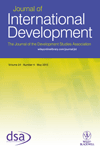
Journal of International Development
Exploring Global Solutions for Sustainable DevelopmentThe Journal of International Development, published by WILEY, is a leading academic journal that focuses on the multifaceted aspects of international development, encompassing both geographic and social science perspectives. With a robust history dating back to 1989, the journal has established itself as a vital resource for researchers, practitioners, and policy-makers aiming to understand and influence development processes worldwide. Featuring a strong impact factor and holding a Q2 category ranking in both Development and Geography, Planning and Development for 2023, this journal is crucial for disseminating impactful research that addresses pressing global issues. While the journal does not currently offer open access, it remains a cornerstone in the fields of development studies, providing in-depth analyses and fostering academic discourse. Set against the backdrop of the United Kingdom, the Journal of International Development continues to be an essential platform for innovation and collaboration in the quest for sustainable development solutions.